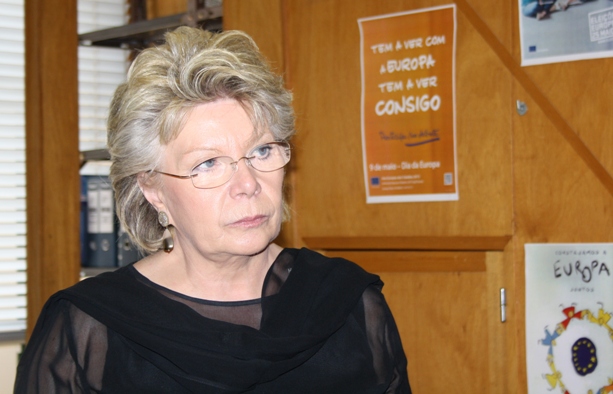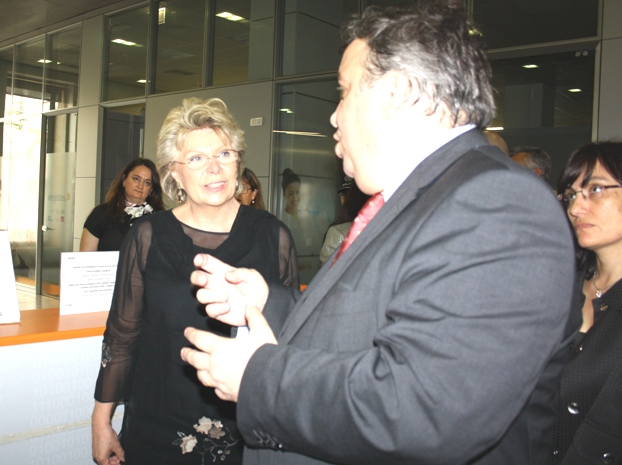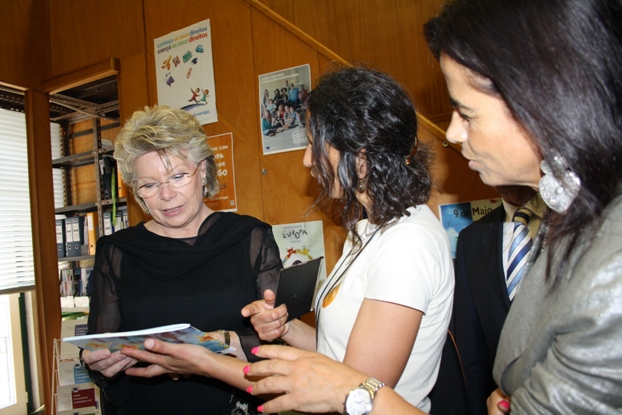 The Digital Assisted Attendance system that the Government wants to associate with the new Citizens' Spaces, «could be replicated in other parts of Europe» and is a good way to overcome some constraints that the European Union has faced in an attempt to implement systems of “ e-government” (use of online public services) in Europe.
The Digital Assisted Attendance system that the Government wants to associate with the new Citizens' Spaces, «could be replicated in other parts of Europe» and is a good way to overcome some constraints that the European Union has faced in an attempt to implement systems of “ e-government” (use of online public services) in Europe.
European Commission Vice President Viviane Reding was in Faro and said that she was pleased with the solutions found by the Government to facilitate citizens' access to State services available online, in this project supported by European Funds.
According to Secretary of State for Technological Modernization Joaquim da Costa, the "Citizen's Spaces" appear "as a complement" to the decentralized services of the State and want to be "close to the population". The government expects that, by the end of 2015, XNUMX spaces of this nature will open throughout the country, as a result of partnerships between the Central Administration and local authorities or the CTT.
According to the member of the Government, the Assisted Digital Service, the basic concept behind these spaces, «combines the digital service, which is on the computer, with the face-to-face service, with a specific employee».
 A system whose usefulness is defended by Viviane Reding. “A few years ago, when I was Commissioner for Technology, I saw that it would make a lot of sense to move from the old 'Gutemberg' days (laughs) to the new [Internet] days that make things easier for people. It even had a slogan at the time: "Go online, don't stand in line (go online, don't stand in line)", said the now EU Justice Commissioner, on the sidelines of her visit to the Europe Direct Center and of the presentation session of the “Espaço Cidadão” project.
A system whose usefulness is defended by Viviane Reding. “A few years ago, when I was Commissioner for Technology, I saw that it would make a lot of sense to move from the old 'Gutemberg' days (laughs) to the new [Internet] days that make things easier for people. It even had a slogan at the time: "Go online, don't stand in line (go online, don't stand in line)", said the now EU Justice Commissioner, on the sidelines of her visit to the Europe Direct Center and of the presentation session of the “Espaço Cidadão” project.
“This is easy to say, but a large part of our population does not know how to use the Internet. For younger people, it's not a problem. But for the older ones, it is. And if they are not helped, they feel lost. Therefore, they need a space where they can go and help. This type of “one stop shop” (store where various public services are concentrated) is something that we will need in an intermediate period, until the new generation grows», he considered.
At the time when the European Union tried to implement online governance systems, namely in the areas of public administration, health and education, they were faced with asymmetries between countries that made their extended implementation unfeasible.
«The ideal would be to do everything on the Internet, but it takes time for that. (…) This concept could be replicated in other countries. In Northern Europe, it won't be as necessary as the population is, in general, info-included. In southern, central and eastern Europe there is a large part of the population that is not», he said.
 One of the solutions that was tried was “to put the grandchildren to teach their grandparents, reversing what is the normal process”. “We have to find new ways to take advantage of new technologies”, he considered.
One of the solutions that was tried was “to put the grandchildren to teach their grandparents, reversing what is the normal process”. “We have to find new ways to take advantage of new technologies”, he considered.
Viviane Reding is this Tuesday in the region to participate in the meeting of the European People's Party, which will take place in Albufeira. “But every time I'm in a region, I like to see with my own eyes how the projects we support are being implemented,” he said.
On this visit, the vice-president of the European Commission assessed how the Algarve's Regional Coordination and Development Commission applies the funds it manages, being pleased to see «that they are being applied to projects that serve people and for the good of the communities and are not being squandered”.
"I'm very happy to see the way they found to preserve the way of preparing traditional food, because it can be an asset for high quality tourism in the region," he added.


















Comments